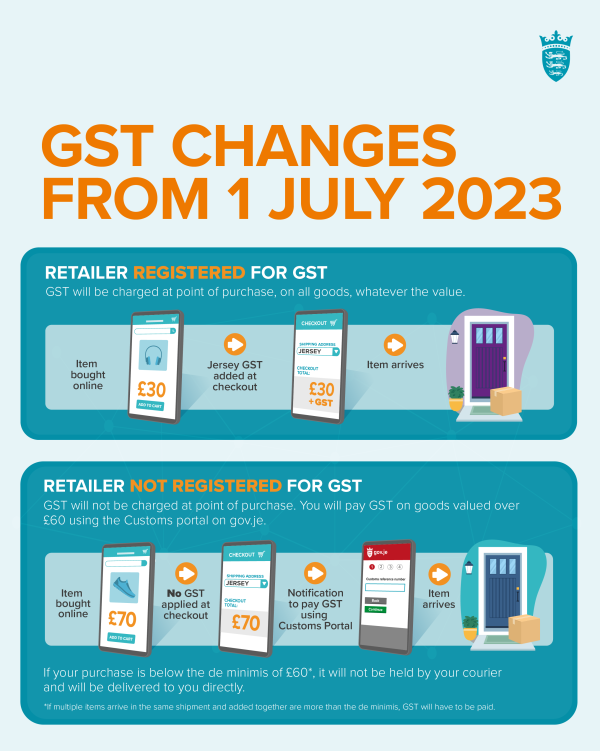Revenue Jersey and Customs have announced changes to the Goods and Services Tax (GST) regulations, set to be implemented from 1 July 2023.
These changes, previously deferred from 1 January 2023 as part of the cost-of-living Mini-Budget, aim to create a level playing field for local retailers and ensure fair taxation in cross-border transactions.
The modifications primarily target larger offshore retailers, including prominent players such as Amazon and eBay, while also streamlining the GST payment process for consumers.
Q: Why is the reduction in the De Minimis level being implemented?
A: The reduction in the De Minimis level is in line with actions taken by the UK and the EU. It aims to ensure fairness between local and offshore retailers and to eliminate the administrative concession on lower-value items.
Q: What is the GST De Minimis level?
A: The GST De Minimis level is an “administrative easement” to help Customs Officer clear imported goods as quickly as possible. It allows them not to charge GST on lower-value consignments of goods and avoids the costs and paperwork associated with detaining goods pending receipt of payments.
The law was changed in 2021 to require larger offshore retailers (like Amazon, for example) to register for Jersey GST, from 1 January 2023 (although a deferral to 1 July 2023 was later agreed). (Big offshore retailers needed at least a year to prepare for the changes – computer programming, new Customs procedures etc).
Once larger offshore retailers have registered for GST and start charging GST from 1 July 2023, that tax will be collected at the point of purchase and sent direct to Jersey’s Treasury. The related goods will then be subject to quicker clearance procedures by Customs.
It will also be easier to deal with the larger offshore retailers on “returns” for example as there will no longer be a related (Customs) refund procedure as the retailer will deal with any refund including the GST.
This in turn means that it is then possible to reduce the De Minimis level to £60, also from 1 July – because it will only apply to the fewer number of goods being imported from smaller offshore retailers who are not required to charge GST. In those cases, where consignments exceed the £60 De Minimis level, it will be the obligation of the Jersey-based customer to pay any Import GST in the usual way.
It is worth noting that some offshore online retailers (typically with a high-street presence in Jersey) have been registered for GST for some years (and have charged GST). It is also the case that some smaller offshore retailers will voluntarily register for GST to benefit from the quicker Customs clearance arrangements.
Q: So why change?
A: Ever since the GST law was introduced in 2007, successive Governments have said they would require larger offshore retailers to register for GST when it was safe to do so (ie when we believed it would not cause them to stop doing business in Jersey).
That time came in 2021 when both the UK and EU required the big retailers to start charging VAT at the rate applicable in the countries of destination of goods. Once the big retailers had invested in systems changes to allow for that, then it was increasingly likely that they could accept the marginal costs of doing something similar for Jersey.
The Government has worked closely with retailers and logistics providers since 2021 to make sure goods will flow as smoothly as possible from 1 July 2023.
Q: How do you ensure that retailers won’t charge GST on top of VAT?
A: Guidance notes have been provided to overseas retailers, clearly stating that sales to people in Jersey should not be subject to VAT or its equivalent. Retailers will need to update their systems to recognize Jersey and apply only GST at the point of sale. Customers should check with retailers that VAT has been removed at the point of sale.
Q: Will retailers stop delivering to Jersey due to these changes?
A: No, retailers have been working with representatives to implement these changes. They see it as a benefit because it enables faster delivery to their customers, as the GST will no longer need to be paid upon arrival in Jersey.
Q: Will the delivery of goods be slower due to these changes?
A: Jersey Customs and Immigration, along with shippers, couriers, and Jersey Post, have collaborated to ensure that goods sold by GST registered online retailers and marketplaces are recognized on the system. This will expedite customs clearance for GST purposes and speed up the delivery of goods.
Q: Where can I find the list of U.K. companies charging 5% GST on imports?
A: The GST register is not public but anyone wishing to check whether a supplier is legitimately GST-registered can ask to see their Registration Certificate or approach Revenue Jersey.
It will be clear from 1 July who is charging GST; this will include all of the larger offshore retailers who routinely supply goods to Jersey, including online “marketplaces” such as Ebay and that hosted by Amazon.
Smaller offshore retailers (who do not have turnover exceeding £300k annually in Jersey) do not have to register and charge GST at the point of purchase but some will do so to benefit from simplified customs procedures.
Where GST has not been charged at the point of purchase, the De Minimis level of £60 will apply and, where the value of goods exceeds that level, customers will need to pay GST themselves in the normal way (using the Customs’ CAESAR portal).

 blog.gov.je
blog.gov.je